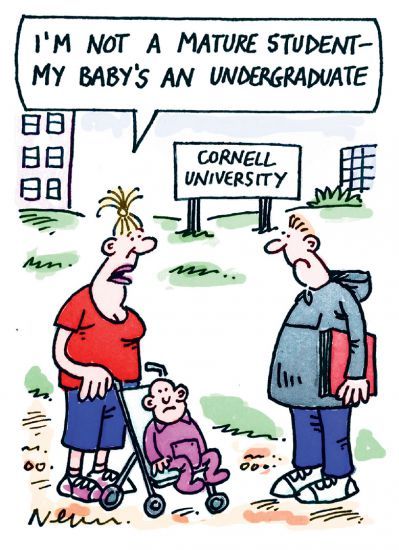
Cornell University’s youngest-ever student, who made headlines last month, has now started his course at the Ivy League institution, aged 12. Jeremy Shuler, the homeschooled child of two aerospace engineers, is finding classes “kind of easy” so far, the Associated Press reported on 2 September. Jeremy said of his engineering course at the university: “I was nervous at first, but I’m a lot more excited than nervous now. As Mommy said, all the kids in math camp were older than me, so I’m used to having older friends. As long as they like math.”
Theresa May’s morphing into Margaret Thatcher has continued apace with a visit to meet one of the Iron Lady’s favourite academics. Having channelled the former prime minister in her dispatch box drubbing of Labour leader Jeremy Corbyn in July, Ms May took another leaf out of Baroness Thatcher’s playbook by touring the University of Warwick’s industrial research labs with Lord Bhattacharyya, the Coventry Telegraph reported on 1 September. The new prime minister’s tour included a look at one of the world’s most-advanced driving simulators, a human-powered submarine built by students and plenty of photo opportunities in Warwick’s high-tech centres. If Ms May sticks around in No 10, expect plenty more trips to the labs of Lord Bhattacharyya’s Warwick Manufacturing Group, which Lady Thatcher visited three times while in office.
What links burkini-clad bathers on France’s beaches and UK graduation ceremonies? According to The Daily Telegraph’s Allison Pearson, both are now part of a “clash of cultures” that raise profound questions about multiculturalism and our acceptance of alien and sexist customs as the norm. In an opinion piece on 30 August, Ms Pearson explained how a friend, referred to only as Jackie, had been taken aback to see female Muslim students wearing gloves to shake hands with a university principal at a London graduation ceremony. “You think how weird is it that a university, of all places, is pandering to a minority instead of saying, ‘I’m sorry, but this is how we do things here’?” said Ms Pearson’s friend. Ms Pearson presented a scenario that few have considered until now: “How long before the university decides to dispense with handshakes at its graduation ceremony lest it cause offence to those who won’t participate?”
Online media giant Vice made a foray into higher education by launching its “most evil British university awards” on 1 September. Among those on the shortlist were the University of Oxford for its refusal to take down the statue of “raging racist” Cecil Rhodes and the University of Cambridge for, among other things, using outspoken historian David Starkey in its promotion material. But the top prize was shared between University College London and Goldsmiths, University of London, with each institution scoring a five out of five “evil rating” in part thanks to rising student rents. “UCL, Goldsmiths, you are so very evil that we couldn't agree on a definitive top place,” explained the US-based website, calling on the “deeply flawed, dishonourable winners [to] wear your iniquitous nature on your sleeve for all future students to see”. This is not a category that will be found at November’s Times Higher Education Awards, whose shortlist of the sector’s outstanding achievers was announced on the same day as Vice’s alternative list.
An engineering professor posted a sarcastic trigger warning on course information for the new term. “TRIGGER WARNING: physics, trigonometry, sine, cosine, tangent, vector, force, work, energy, stress, quiz, grade,” Peter Schwartz wrote in his information for students at Auburn University in Alabama. “I think trigger warnings are a joke to begin with and I wanted to see what one might look like in an engineering course,” Professor Schwartz told local news site AL.com on 31 August. “Looks kinds of silly, doesn’t it?”



